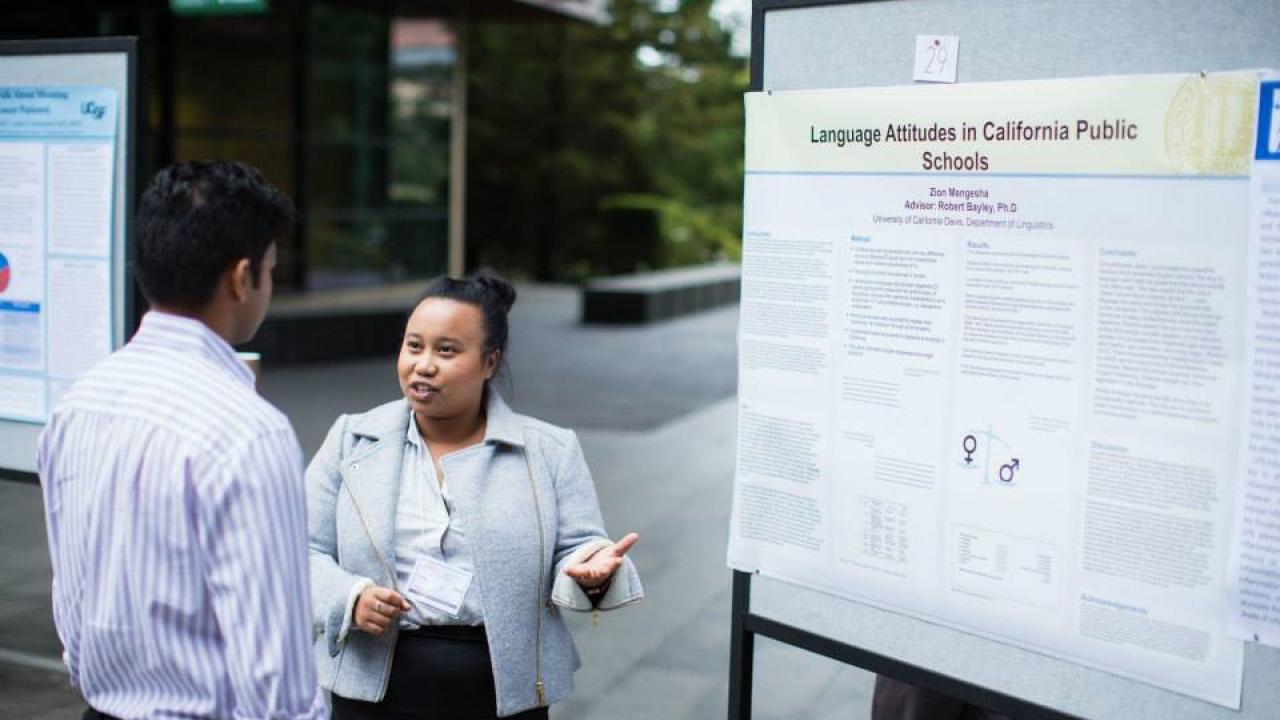
Senior Earns Chancellor’s Research Award for Linguistic Profiling Study
Zion Mengesha, a graduating senior in linguistics and philosophy, has been selected to receive this year’s Chancellor’s Award for Excellence in Undergraduate Research for her study on language bias in the classroom.
This award comes with the Dean Keith Simonton Prize of $500.
For her honors thesis, “Teachers’ Language Attitudes Toward African American Vernacular English,” Mengesha asked teachers at three public schools in California — a suburban high school, urban high school and urban city college — to listen to a male student reading the weather report either in African American vernacular dialect or in standard English.
The teachers were then given a language attitude test and asked to rate the speaker on a range of opposites, such as educated/not educated, athletic/not athletic, employable/not employable.
Mengesha found that many teachers rated the speaker higher for athleticism and attractiveness but lower for reading comprehension and literacy when he used African American English.
“Linguistic profiling caused hiring discrimination at the suburban school of this study,” she said. “Teachers would not hire him for the radio station in African American vernacular English, but would in the standard English guise.”
Mengesha has presented her research findings at conferences at UC Davis, Stanford and UCLA. At Stanford this spring, she received an award for best research in the social sciences.
Language and expectations
Robert Bayley, a professor of linguistics, said her study sheds light on how teachers’ attitudes towards language affect their expectations of student achievement. “Importantly, although the results show some improvement in negative attitudes toward speech identified as African American, the results also show just how much further we need to go to counter expectations based on what linguist John Baugh refers to as linguistic profiling.”
Bayley worked with Mengesha for two years, first as her mentor in the MURALS program (Mentorships for Undergraduate Research in Agriculture, Letters and Science) and later as her adviser for her honors thesis. “Zion is one of the very top undergraduates I have worked with in 40 years of teaching,” he said. “She is very focused, open to new ideas, intellectually curious, and she faces challenging materials with enthusiasm. It's been a pleasure and an honor to work with her.”
The UC Davis Department of Linguistics also selected Mengesha for its outstanding senior award. She has been a peer advisor for linguistics majors and volunteer research assistant in the phonetics laboratory as well as a member of the UC Davis Restorative Justice Taskforce.
Mengesha traces her love of language and linguistics to her upbringing in a multicultural home in the San Francisco Bay Area. “My mother is from the Philippines, and my father is from Ethiopia. Growing up in Daly City allowed me to learn Tagalog from my family and local community. I took Spanish courses in high school, and in college I studied French at the Université Paris, Sorbonne.”
An introductory linguistics course at UC Davis sparked her interest in studying dialect discrimination. There, she learned about a 1979 federal court decision requiring public school teachers to take into account students’ “home language,” including African American dialect, in teaching them how to use standard English.
The Ann Arbor Decision resulted from a lawsuit filed on behalf of African American children who were disproportionately placed into special education classes in their predominately white middle school because of they way they spoke.
“Inspired by this story, I began my research project,” she said.
— Kathleen Holder, content strategist in the UC Davis College of Letters and Science
